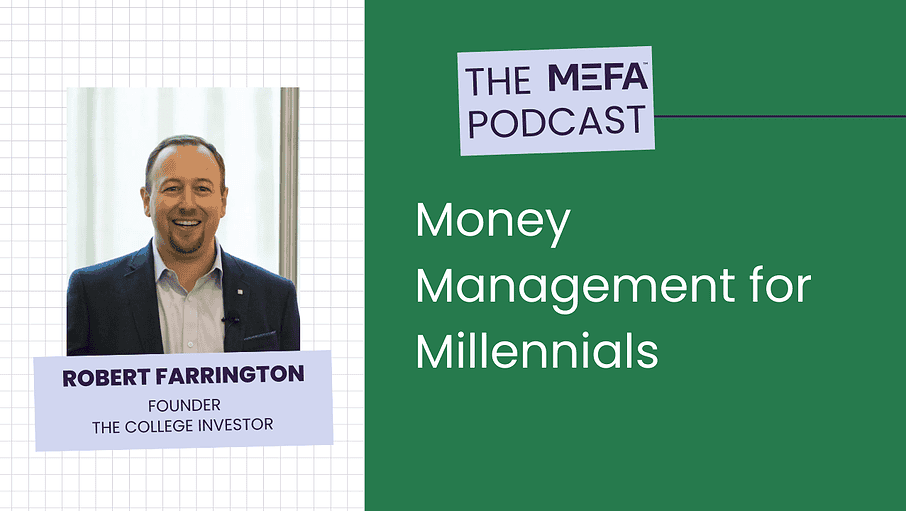

Resources Mentioned in this Episode
Jonathan Hughes: [00:00:00] Robert Farrington is a millennial money expert and founder of The College Investor. He’s on a mission to help millennials get out of student debt and start building wealth for their future. And he also helps parents make smart choices about college financing options and navigating the complex world of paying for school.
We know what that’s like. Through his work at thecollegeinvestor.com, Robert has emerged as one of the nation’s leading student loan debt experts. And if his name sounds familiar, you may have seen his writing in Forbes or the Huffington Post. Welcome to the MEFA podcast, Robert Farrington. How are you?
Robert Farrington: I’m great. Thanks so much for having me. I’m excited to be here.
Jonathan Hughes: I gave everyone the kind of high level, introduction. But why don’t you tell folks exactly what it is that you do at the College Investor?
Robert Farrington: Yeah, so I am the [00:01:00] unintentional financial guy. Never planned on writing about this stuff or talking about this stuff. I really wanted to start the College Investor as a side hustle to share the fun stuff about building wealth. And I wanted to talk about side hustling, earning more money. Maximizing your income so that you could start to invest and build wealth for the future. But then like many millennials and young adults my age, I had student loans and this was over a decade ago.
At this point in time, I started encountering problems with my own loan servicer. when they were misapplying payments and kicking me out of direct debit. And this was in 2009 well before anyone was talking about the student loan debt crisis and this being a thing. So what does any good blogger do?
I started writing about it and that was some of the earliest work that I published that really started resonating with people and I couldn’t tell you the comments of people saying, me too, this is a problem and no one’s talking about it, nobody’s addressing it. And so I started really writing and learning [00:02:00] and understanding and researching more about what the heck is going on with student loans.
And of course like I said, that was what? 2009? So we’ve all grown up since then. Now us millennials are having kids. We’re thinking about saving and paying for college and people are trying to avoid these same situations that they found themselves in. And so really have started talking a lot about all of this stuff, right?
So getting out of student loan debt to build and invest for the future is still my favorite topic. But of course that really relates to saving and paying for college and helping set up your kids and all types of personal finance subjects as well.
Jonathan Hughes: Let’s get to it then. As someone who follows higher education and college costs and writes about it for a living, what do you see as the emerging trends in higher education, particularly from the financing side?
What’s happening in general with the cost and with the bigger picture of how people afford college?
Robert Farrington: Yeah, I think, we really at this inflection point where there’s a big realization that the costs have gotten to a point where they are just [00:03:00] really being a burden on people. And I just remember growing up when I was in high school and it was this mindset that every single American should go to college.
And if you didn’t go to college, you were a failure, and that is how our teachers and our guidance counselors and the media portrayed everything. And I do think it’s I view it as a pendulum, and so this pendulum swung out to the farthest extent, and that was probably the early 2000s to the 2010s, was, like, full extent, pendulum swung out to everyone needs to go to college, and I think since that time.
It’s starting to come back in. Of course, we’re nowhere near like everyone should not go to college, of course, but I think we’re at this realization that college is still a really valuable thing, but there’s a lot of ways to get education. I think we’re seeing a big focus on trades, apprenticeships, other alternative paths.
I think in the last few years, it’s been this emergence of like coding academies and things and say what you will about them. But again, it’s like trade school [00:04:00] except in the technical space. And just realizing that maybe a traditional four year college isn’t for And then even within the traditional four year college space, I think we’re finally seeing some trends emerge about why are the costs what the costs are.
And, there’s been some various pieces of legislation put out there and different things that says we need to start holding schools accountable to both costs and the outcomes they’re delivering for their students. Because, maybe you can charge $100,000 a year. If your students outcomes are worth it, I think we’re saying to ourselves as a society in a country that like, but if they’re not having financial outcomes that reflect the value that they paid, maybe that’s a problem.
And so I think we’re at this weird inflection point of trying to navigate all these various issues. We also you know, have some job shortages in things like the trades and vocations and so like we didn’t train our country and our society to go into these things. And we might have an [00:05:00] overpopulation in things like tech and other spaces where we’re starting to see layoffs in different things.
So I think economically our countries in this weird spot, but it also reflects higher education to this point. And then you know, What that transition looks like in the next few years.
Jonathan Hughes: I think you’re right. I think we are at this inflection point where people really are considering other paths, right? And what are some tools that students can use or counselors or what are some things that they can think about to determine whether or not college or another pathway might be right for them?
Robert Farrington: Yeah I think we’re at this cool place to where I, we didn’t have this when we were in high school, but like today you can literally google every job, find the salaries, see what kind of career paths there are out there.
I think there’s really 22 hard things though, right? Is one when you’re 17 or 18 years old, you don’t know what you want to do, right? Part two is even when you go to college because you think you want to know what you want to do, like the data says that what, like 30 percent [00:06:00] of people like actually go into careers in their major.
So it’s even if you think you know, you probably don’t know. And but what I really like to encourage families and especially the broader community, because as I talked to high school kids, a lot of them actually understand the math. And we don’t give them enough credit for this, but they succumb to the peer pressure and the family pressure of like where to go to college and like how much to spend for college.
So I approached this from a very ROI driven approach, return on investment. I view higher education as a financial investment. But before we dive into that, I do want to separate education as a whole. is phenomenal. It’s important and it can be free. There’s so many ways to get free education and different things, but going to a four year college specifically is a financial investment.
And it’s not necessarily an educational investment. You’re doing it as a social signal. You’re doing it to get that diploma. And most people are doing it to, earn more money in the career or to get into a certain [00:07:00] career. I would really question would people still go to college in the amount of people that are going to college, the numbers, if it wasn’t an earning potential pathway, like to grow that earning potential, right?
So we have to view it from that standpoint, in my opinion. So I like to work backwards just like we would with any economics problem, right? You’re going to spend a certain amount of money and the goal is to use that certain amount of money to make more money over your career because you’re going to have a higher earning potential.
And so that’s really what I want to equate to students. If you spend too much money to earn this degree it could be a negative ROI. Like your earnings after you graduate might not cover the cost you spent. To go to school on the flip side. If you are, get through college with spending very little, you can have a huge ROI after graduation because your earnings can reflect that.
And so as we talk to young adults, I always like to encourage them to like, Hey, what do you want to do? What pass you want to do? And then play it conservatively because we all change. If you don’t know what you want to do and you’re going to be a [00:08:00] general business major or something more general you should probably spend on the lower end.
Yeah. So that, whatever that path happens to be when you’re in your late 20s or 30s, like you’re getting an ROI on your degree. There’s nothing worse than spending too much to go to college and then, things aren’t working out and then you’re just struggling to pay this and then you’re even more frustrated about your educational experience because of it.
Jonathan Hughes: I couldn’t agree more about the pressure aspect of this that I think a lot of people make decisions based on Negative impulses, right? They don’t want to fall behind, or they don’t want to look like they don’t know what they want to do, so they make a decision.
Robert Farrington: Yeah, or they don’t want to, disappoint mom and dad. Maybe dad was an alumni at some private university, or they don’t want to be that person in their friend or family group that like everyone’s going to college, but they’re like, I’m going to go to a community college and transfer to my state school. But they feel a burden of potential shame by [00:09:00] taking that pathway when maybe their friend group or their family group is all like a four year only path.
And I think that’s what’s really hard to help these kids overcome is they will completely write off a community college off the table if they don’t have anyone that’s had that experience in their friend or family group.
Jonathan Hughes: How can we break through that and get these kids to consider these things?
Robert Farrington: Yeah, I think it’s really just, again, it comes down to what the families are telling them, what their guidance counselors are telling them, what their teachers are telling them, but then it’s also showing them role models that have done it. I think that’s a big factor for both the community college to a four year route.
It’s also the role model of. Going into trade school or vocational school, like what successful role models are these high schoolers seeing in their communities and in their lives that have taken these pathways? When I grew up, the only like role models we were seeing was like Bill Gates and Jeff Bezos and you should go into tech and that’s [00:10:00] how you be successful.
You’re not hearing about the companies that are like, “hey, like I run a plumbing business and I still make, $250,000 a year.” And it’s a phenomenal way to work, especially if you don’t want to be in an office. But it’s hard because if you don’t have that role model in your family or your friend group you might not necessarily equate that pathway with success because you just never seen it.
On the flip side too, they’re still 17, 18 years old. And so they’re looking for that experience. And they’re looking for, like-
Jonathan Hughes: The college experience, right? That’s the other thing that, that they want, that people want.
Robert Farrington: Yeah. And I happen to be in Southern California in San Diego, right? And so it’s there’s a lot of kids in this country that want to come here to go to college because they want like a Southern California college experience and- but should you be paying like potentially out of state prices? Room and board, and racking up a lot of costs for said experience which you’re just going to end up paying back for the rest of your [00:11:00] life potentially, or 20 years of your life.
And that’s, what’s really hard to help them understand because, a lot of these young adults haven’t had bills like that. They don’t really understand the costs. And even when you borrow. You don’t necessarily under the cost until five years down the road, right? When you start having to make repayments and parents typically didn’t have this same experience.
Even if you went to an out of state college in the 70s or 80s, you weren’t paying what kids are paying today all in. And so it’s hard for them to equate that. Maybe the math doesn’t work out.
Jonathan Hughes: The question of how much should I pay for college becomes how much should I borrow to pay for college, or how much borrowing is too much. Do you have any guidance on that particular front for students?
Robert Farrington: I do. My rule of thumb is, and, it’s become more common, but you should never borrow more in total than you expect to earn in your first year after graduation. It’s a conservative bet, but let’s just say you want to be a teacher.
That’s great. Google what a starting [00:12:00] teacher makes in your state and maybe it’s $40,000 a year. You probably shouldn’t borrow more than $40,000 a year total to become a teacher in your state on the flip side. Maybe you want to become an engineer, right? So go Google what an engineer makes and where you want to work and maybe the starting pay $65,000 a year. Again, you probably shouldn’t borrow more than $65,000. An aggregate to get to that path. Now, granted, of course, there’s a lot of variations and there’s also how much you should borrow versus how much you should pay, right? I view it very much. I view higher education and this is a, my, one of my analogies is it’s a car, it’s transportation, right?
The goal is to transport you through this higher education cycle to get to that career and that earning potential that you want. And you have a choice of what kind of car you can buy. You could go out and buy like the 10 year old Honda Civic and pay a little bit or you could go buy the new G Wagon and pay a lot of money.
And if you [00:13:00] have the money and you have a huge amount of money and you’re wanting to spend it on the G Wagon and you can afford it. Go for it. I’m not here to tell you how to spend your money, but if you’re going to borrow, you probably shouldn’t get a loan for the G Wagon. You should probably think about maybe getting the less expensive Honda Civic to get you to the same place where you want to go, which is get that four year degree and get into, a good paying job.
Jonathan Hughes: We mentioned earlier that students do get the overall math of college. Do you think they get?
Robert Farrington: I think they don’t and that’s the hard part. And I think, our loan system is very, it’s very hard to understand. It, there’s so many options. An analogy I heard years ago was it’s like a deli sandwich. And what I mean by this is you look, go into the deli shop and there is this massive sandwich in the window with layer upon layer, cheese and meats and lettuce and tomato and it’s stacked, a foot high and it looks amazing, but you try to eat that thing and you can’t bite into it. It [00:14:00] all falls apart. It’s a mess. Yes. And that’s how our system is. And we just keep adding layers. And we never make it easier to eat the sandwich.
Jonathan Hughes: I know of what you speak on both ends.
Robert Farrington: There you go.
Jonathan Hughes: I actually want to ask you about a couple of articles that you’ve written recently about repayment. And one of them I want to, I wonder if you could talk briefly about. Why? Because we just have had millions upon millions of student loan borrowers go back into repayment, right? And I thought you had a really good article about why you should not miss early payments when going back into repayment. Because there’s a reason that some people might be tempted to do so in this particular case for their federal student loans, right?
Robert Farrington: Yeah, I mean If you have a payment due, you need to make it. And there’s a few reasons for this. One is it’s all going to come due whether you start or don’t start. And you can really screw up your credit. And I think a lot of people think that, [00:15:00] I’m in this grace period and things aren’t going to be reported.
And that’s true, but they will at certain points. And I know behaviorally is if you don’t start now. It gets harder and harder to start from a behavioral standpoint, like you’ve got to get going and get in the, get programs going like you just got to do it. But part two is a lot of people think that maybe I can avoid this, $100 student loan payment and just not pay it.
And my credit, whatever, I’m going to trash my credit. But what they don’t realize is when you trash your credit, you will suddenly pay more in everything else in your financial life. And you’d be surprised that hundred dollars was probably a better deal than higher insurance rates. More deposits for your cell phone plan.
You’re going to get rent a new apartment. Your landlord one might not rent to you too. They’re going to require a bigger security deposit. Like all these other financial things in your life suddenly become a lot more expensive. And so you thought you were saving. On a student loan payment, when all of a [00:16:00] sudden that same amount just got applied to like literally every other financial expense in your life.
And you still will eventually owe that student loan payment. So it’s just, there’s no real good mathematical reason to avoid it. And then, with all these new repayment plans, specifically the SAVE plan. You might have a very low or even zero dollar student loan payment with your federal student loans And it’s like it’s a gimme like go apply to save You know, it’s very hard to have a high student loan payment with the save plan unless you’re doing well financially which is kudos to you.
Jonathan Hughes: So I wonder if you could talk about the SAVE plan a little bit of why exactly it’s so attractive.
Robert Farrington: Yeah, so the SAVE plan sets your student loan payment. It’s an income driven repayment plan, right? So it sets your student loan payment at currently 10 percent of your discretionary income. In July, it’ll be 5% of your discretionary income. It’s going down. And then part two is they change the rules for what discretionary income is.
So they raise the bar. Discretionary income for the SAVE plan is [00:17:00] calculated at 225%. of the poverty line. It used to be 150 with all the other plans. So they raised the bar there, and then they’re going to cut the actual payment on both ends. So not only do you get to shelter more income every month before you have to even make a payment on the save plan, it’s going to be a lower payment when you actually have to make it.
And so what this means for borrowers is if you’re a single person, You’ve got to make about $40,000 a year or so before you even have a payment due. And if you’re a family of four, you’re going to be in the $60,000 a year plus before you even have anything more than a 0 a month payment. And then part two, like all income driven repayment plans is there’s loan forgiveness built into the save plan.
So after 20 or 25 years, you’ll get your loans forgiven, but there’s a new one here is if you have $12,000 or less on the save plan when you start after 10 years, they’ll start wiping that balance.
Jonathan Hughes: In all the [00:18:00] time we’ve been doing about. loans, we’ve primarily been talking about federal loans. And in fact, one of the only pieces of advice that MEFA gives, and MEFA is a private loan lender one of the only pieces of advice we give to everybody is that if you’re going to be borrowing anything at all, you start by taking those federal loans first. They’re the best options, but we know that oftentimes people also, in addition, borrow privately because they need to cover a balance. With anybody struggling to repay private loans, what kind of guidance would you have for those individuals?
Robert Farrington: Yeah, so first, and I see this with everything, is you have to get organized. I’m very, and I’m not shocked at this point in time, but one of my, the most common things I say is, someone will come and they say, I don’t even know what to do I have these loans, what not. What do you have? And 98 percent of the time they don’t even know. And so it’s very hard to even make a good financial decision if you don’t know what’s going on. So I always say you need to know what’s coming in. You need to know what’s [00:19:00] going out. You need to know what you own and know what you owe.
And this means breaking it all down, like what’s your federal loans, what’s your private loans, what’s your income, what’s your expenses. Once we lay it all out, we can really start making better decisions on how to navigate this. And I know this sounds like personal finance 101, it’s because it is and most people don’t do this part.
But then it’s like, how are you handling your federal loans? Are you on the SAVE plan? What’s your repayment plan? Okay, what’s that monthly payment look like? Then what’s your private loan payment look like? Okay. And then We go to the income and the expenses and like what’s the gap we’re trying to close.
Like what can’t you do? And but until you lay it all out there, I can’t tell you what the answer should be. Is it that you are spending way too much money and you need to cut expenses? Is it that like you’re not earning any money and you need to go look at getting a different job or maybe side hustling?
Is it that you haven’t even set up a repayment plan on your federal loans and so that’s taking a huge amount of your [00:20:00] budget when you should be on save. And that would lower it so much that you’d have all this extra money that you could apply to your private loans. Like we have to get organized and there’s really no one size fit all, but until you do that organizational exercise. It’s so hard to say what levers in your personal finance life we should be pulling to fix the problem.
Jonathan Hughes: And one final bit of advice for anyone who’s looking to go to college or straight into career, what should they be looking to do?
Robert Farrington: Yeah, and this is the hardest question that a 17 year old or 18 year old and their family has to answer. But take a little time to think about what you want to do. I’ll also say, maybe you don’t need to go to a four year college right away. Maybe you take a gap year. Us Americans, we don’t do gap years, but like in other countries, it’s very common to take a gap year, go work, go travel, go get an internship because the more exposure you get to different career paths and options and things will help [00:21:00] you understand better what you want to do.
And then it becomes even better for your ROI and the value you get when you go to college. So go explore, go experiment. I recommend you get a job. I recommend you try internships. Just get as much exposure as you can. And if you’re a family member and you’ve got a high schooler, Try to find ways to get them exposure, whether that’s friends and family, send them to work with a friend go do like a ride along with somebody get them out there, because most of us learn by observation, and if they’re not observing it, if they’re not seeing successful paths from various different ways to do it it’s very hard for them to make a decision on the right path for them.
Jonathan Hughes: Robert, thank you very much for being here. Hopefully you’ll come back.
Robert Farrington: I would love to.[00:22:00]
Jonathan Hughes: Alright, thank you to Robert Farrington, the college investor, for being here. I really enjoyed that conversation. And if you want to check out everything else that he has to offer, you can visit thecollegeinvestor.com. Oh, and if you liked what you heard on the show today, and you want to hear more from us on planning, saving, and paying for college and career readiness then you can follow the show and you can do that wherever you get your podcasts.
And if you did enjoy it, please make sure to let your family and your friends know and to leave us a review because it does help us to keep doing what we’re doing and getting the show out to folks like you somehow. I want to thank our producer Shaun Connolly. I want to thank AJ Yee. I want to thank Lauren Danz and I want to thank Lisa Rooney for their assistance in getting the show posted. Once again, my name is Jonathan Hughes and this has been The MEFA Podcast. Thank [00:23:00] you










